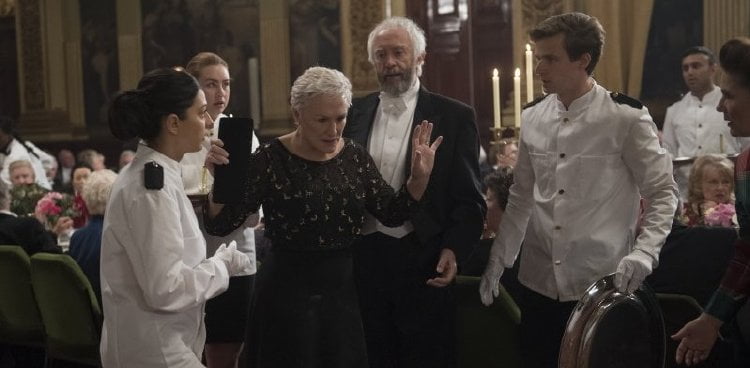The Wife

Joe Castleman (Jonathan Pryce, Harry Lloyd in flashbacks) is largely considered America's greatest living novelist, but although he credits his wife, she has endured years of infidelities. In fact, their partnership began as one when, as a married creative writing professor at Smith College in 1958, he seduced his talented young student Joan (Glenn Close, her daughter Annie Starke in flashbacks). Now, traveling to Stockholm in 1992 to accept the Nobel Prize in Literature, Joan is reevaluating their long term partnership as she juggles potential catastrophes of his making in "The Wife."
Laura's Review: B-
Glenn Close's phenomenal performance and Swedish director Björn Runge's elegant production are the sole reasons to see this film which otherwise plays like an airport paperback gussied up with an embossed leather cover. Adapted from Meg Wolitzer's novel by Jane Anderson (HBO's 'Olive Kitteridge'), the film is structured like a mystery, an unnecessary tactic when it is the marital drama that is the story's meat. Plot points are delivered with blunt force. When a frisky Joe comes to bed, Joan acknowledges his attempt at lovemaking as an excuse to blow off pent up energy before acquiescing. An early morning phone call is perhaps the cause of his excitement, but when Joan hears the news on an extension, that Joe is to be awarded the Nobel, we see the light drain from her eyes. At a celebration at their sprawling stone home by the sea, Joe accepts accolades as Joan quietly attends to guests with a smile. But there is one, their son David (Max Irons, "Red Riding Hood"), who has something else on his mind, his father's evaluation of his own short story. Joe fends him off, just as he does his would-be biographer Nathaniel Bone (Christian Slater), who's booked himself on their Concorde flight. Joan intervenes to smooth both situations over, but when Joe's assigned pretty young photographer Linnea (Karin Franz Körlof) by the Nobel committee, Joan merely observes the signs she's read for a lifetime. She makes one request of her husband - that he not acknowledge her during his speech. Close really is remarkable here, her calm elegance only betrayed by the calculations we can read in her eyes. There is a hint of uncharacteristic rebellion in the way she informs Joe where his second pair of glasses are and when to take his pills just before informing him that she intends to spend their first day in Stockholm on her own. Waylaid by Bone in their hotel lobby, the actress slowly loosens up with his proffered cocktails, clearly enjoying, if also analyzing, the attention. Her daughter ably stands in as the young Joan, but Harry Lloyd offers little of the Joe we first know, his charmless performance undermining the couple's initial attraction. Elizabeth McGovern blazes with barely contained fury as a female author advising young Joan on the impossibility of circumventing the male literary hierarchy. Although the narrative's cause and effect lacks complexity, director Runge's staging is effective with Joe dominant in public scenes. The marital bed is where we first and last see the Castlemans together, initially glowing silver. Costuming, hair and makeup sets the couple apart, Joan stunning and chic, Joe hirsute and rumpled. Jocelyn Pook's classical score suggests a refinement lacking in the story. 'If you're trolling for nuggets of bitterness, you'll find none here,' Joan advises Nathaniel. Oh, but does Glenn Close show us where to find them. "The Wife" is her tour de force. If only it were up to her standards. Grade:

